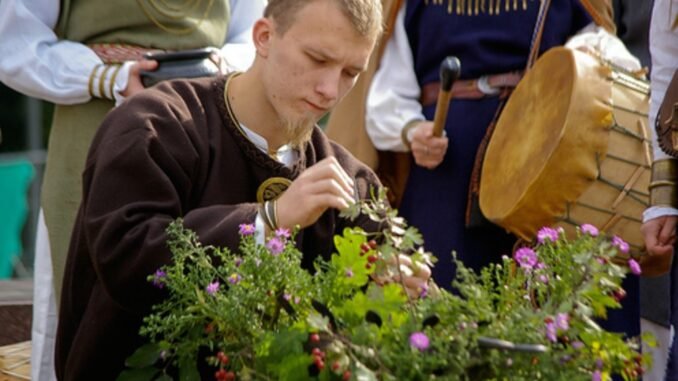
Writings about ancient pagan Prussians or pagan Lithuanians left by chroniclers like Peter of Dusburg or Jan Dlugosz, are heavily influenced by images coming from classical antiquity (Greek and Roman) as well as didactic underpinnings characteristic of their time. Many descriptions therefore do not seem entirely reliable, but some give valuable insights about charms and superstitions practised by ancient Lithuanians.
Looking for safety in face of everyday menace
Pagan religions are characterized by polytheistic beliefs that the world of men is influenced and sometimes ruled by gods and goddesses. Consequently, sacrifices and plead to the gods were a constant feature of pagan societies. Their magical thinking suggested that material sacrifices could influence gods who, in turn, could move animate and inanimate objects of nature.
Rituals by which people sought personal favours from gods, to influence remote individuals or foretell the future are called charms. Predicting future with charms, especially ahead of important actions like military campaigns, was a common practice in ancient Baltic societies.
War was an intimate part of life for thirteenth-century Lithuanians. War was therefore accompanied by numerous rituals and charms. The anonymous author of the Livonian Rhymed Chronicle thus describes a typical scene of Samogitians preparing for a campaign to Courland:
“The priest of sacrifice threw his lots according to the ancient custom and also expertly sacrificed a living animal. Then he said, be glad, Samogitians, much hardship awaits, but you will be protected and will bring victory.”
Practical magic of the battlefield
Not just priests, but ordinary warriors as well knew how to do charms. Peter of Dusburg gives a telling example, describing the Lithuanian Duke Jazbutas who cooperated with German crusaders.
“In summer 1290, Lithuanians returning from an exploit, approached the site where Crusaders were waiting to ambush them and one Lithuanian, throwing his lots, exclaimed: ‘O misery, misfortune awaits us!” The leader told him to be silent, but he cried while the enemy slaughtered many…”
Lithuanians successfully avoided an ambush in 1323, when a soldier used charms to warn his fellow warriors: “Let’s turn back immediately, the Germans are waiting in ambush!” Historians speculate that Lithuanians used special wooden plates or dice to predict the future.
The practice of magic was more widespread in the thirteenth century, although instances in the fourteenth century include charms among soldiers outside the grand duke’s army. It seems that thirteenth-century pagan tribes were accustomed to using charms to locate the enemy, whereas Christian crusaders would send scouts.
Lithuanians, too, would use scouts at least since the times of Mindaugas in mid-1200s, but they did not completely push out fortunetellers until the fourteenth century, when the grand duke established his power over local warlords and rationalized the running of his army.
Charm against the duke’s command
Two telling examples can help trace the eradication of charms and magic from the political life of Baltic tribes.
The first concerns Herkus Mantas, the leader of the thirteenth-century Prussian uprising. When his old German friend, Hirtshals had to be sacrificed, because such was the will of gods, the only thing that could be done was to throw the lot again. After it confirmed for the third time that Hirtshals was to be sacrificed, he had to submit.
The situation was completely different in the fourteenth-century court of Grand Duke Kęstutis. Lithuanians got hold of Jan Zurbach, the master of the Ekersberg Castle, with whom they had long-standing enmities. They wanted to sacrifice the German knight to the gods, but Kęstutis interfered and he was saved. No lot was thrown, the ruler’s word sufficed.
However, as magic and charms lost their role in warfare and politics, they survived in everyday lives. People readily turned to fortunetellers and magicians to cure them of diseases and their unpredictable consequences for centuries to come. Fortunetellers persisted even in the fifteenth century. Jerome of Prague wrote: “Priests would come to the fire at night and, in the morning, would tell they had seen the shadow of the patient by the holy fire, showing sings of death or life.”
Religion goes, superstitions remain
Superstitions are residual fragments of a religion, surviving on the fearful awe of gods and other mythic creatures. Prussians were overtaken by superstition when they killed Saint Adalbert of Prague because they feared that if they allowed Christian missionaries to come to their land, the sun would stop shining, plants would stop bearing fruit and cattle would breed no more.
Other tribes by the Baltic Sea were equally superstitious. Twelfth-century Estonians accused Theodoric the Monk of causing a solar eclipse and wanted to sacrifice him to gods.
There are no surviving reliable testimonies about pagan Lithuanians superstitions. One of the best-known superstitions attributed to pagan Lithuanians is given in the Galician–Volhynian Chronicle about King Mindaugas: “When they would ride into a field and a hare would run into the field, they would not dare to enter the forest or even break a twig.” This may not be an entirely accurate description, but it testifies to the deference with which pagan Lithuanians would behave in holy woods.
When Lithuania accepted the Christian faith, the new religion would not always fit well with ancient customs and superstitions. Some of them were incompatible with Christianity, while others seemed quite neutral and morally upright and therefore would be practised by devout people. The Lithuanian Grand Duke and Polish King Jagiello, for instance, stuck to one ritual until his death. Each morning, he would turn around several times, break a straw three times and throw it away. Jan Dlugosz speculates that he must have learnt the superstition from his Orthodox mother. What it meant no one knew.
By Darius Baronas

Be the first to comment